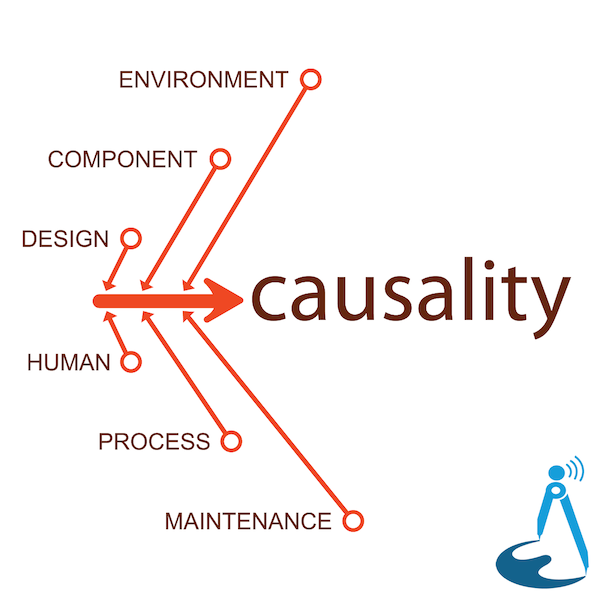
CURRENT
Causality
Chain of Events. Cause and Effect. We analyse what went right and what went wrong as we discover that many outcomes can be predicted, planned for and even prevented.
Premium supporters have access to high-quality, early released episodes with a full back-catalogues of previous episodes
SUPPORT CAUSALITY PATREON APPLE PODCASTS SPOTIFY PAYPAL ME
STREAMING VALUE SUPPORT FOUNTAIN PODVERSE BREEZ PODFRIEND
CONTACT FEEDBACK REDDIT FEDIVERSE TWITTER FACEBOOK
LISTEN RSS PODFRIEND APPLE PODCASTS YOUTUBE SPOTIFY
 PANDORA
GOOGLE PODCASTS
INSTAGRAM
STITCHER
IHEART RADIO
TUNEIN RADIO
CASTBOX FM
OVERCAST
POCKETCASTS
PODCAST ADDICT
CASTRO
GAANA
JIOSAAVN
AMAZON
PANDORA
GOOGLE PODCASTS
INSTAGRAM
STITCHER
IHEART RADIO
TUNEIN RADIO
CASTBOX FM
OVERCAST
POCKETCASTS
PODCAST ADDICT
CASTRO
GAANA
JIOSAAVN
AMAZON

Total Listening Time: 1 day, 5 hours, 16 minutes and 57 seconds.
John has a great voice to listen to. He’s also super smart and breaks the maths and such side of things down enough my brain doesn’t freak out haha. Thanks. Sam. Perth
Really enjoy John’s analysis of these famous safety incidents. Lots to learn here!
A wonderful podcast. Loving it!
I discovered this podcast in a roundabout way investigating Chernobyl & Fukushima. John Chigdey is a passionate genius, I love his delivery, knowledge and analysis. I have never heard of many of these incidents (NOT ACCIDENTS!). It's tragic how these mistakes pile up on each other until the inevtiable happens. Everything seems so safe and reliable until it doesn't. Even if you're not an engineer or a scientist this is a must listen series. I listened to them all pretty much straight in a row. There are lessons here applicable to just about every part of life.
A wonderful podcast. Loving it!
Great podcast. Just finished Fukushima and it’s amazing the amount of misinformation put out by other podcasts that talk about this incident. It’s great to get an engineering perspective on what happened. Keep up the great work.
Fascinating take on the world.
John does a wonderful of walking through and unpicking the incidents discussed. His expertise in control systems and how they factor into unfolding events make this a must listen for anyone with an interest in engineering matters. Keep listening and pay attention.
Thank you this is such a great resource for safety professionals; well researched and easy to listen to.
The disasters covered aren’t overly dramatized and are presented factually with an aspect I think many shows are missing: what was learned and what could be done differently. This is one of my new favorite podcasts
There is no better researched podcast than this one. Amazing telling of disasters with emphasis on engineering and science.
I am entirely fixated on disasters, and this is by far my favorite source. Clean covering, professional with a well of barely hidden rage at the powers that be that allowed these disasters to come to fruition, and a nice voice to boot. If I could give more stars I really really would.
This is one of the few podcasts where the podcaster understands what the word thorough means. No useless information is ever added. The subjects are interesting, heavy, and important. Sometimes it is dry, in the sense he is not making jokes, but that is a positive thing for this podcast but does mean it is not always the most accessible. I’m sure the podcaster knows this as he (to my glee) includes undiluted technical information to help explain the event.
This is a great podcast for me when I need a break from true crime. He talks about cataclysmic events not simply for the morbid entertainment, but to think about the “HOW” and “WHY” factors from the perspective of an engineer. Also, the dreamy Australian voice and calming tone of the narrator is everything. It’s oddly a compliment, but when I need to fall asleep to something that won’t give me nightmares in the way many others of the same genre might— he’s my guy!
As a teacher, I’ve found this podcast extremely valuable in learning great examples of why physics is important in our daily lives. He’s done a wonderful job in the recap of events and then the breakdown of where things went wrong. I highly recommend this podcast!
I enjoy having someone with a more analytical brain talk about what went wrong and why. Too many podcasts focus on the horror of what happened in disasters, as opposed to the causes beneath it. Or they focus on being entertaining and witty. I’d much rather hear someone with a background in science go through cause and effect, and what happens when people and systems fail. For a non scientist such as myself, it’s lovely learning how someone with, I assume, education and training in engineering, perceives man made disaster Great job to everyone involved in this podcast!
Great analysis of various disasters. Fascinating how greed has become one of the main villians in these disasters.
I am a maintenance electrician and it is so interesting how incorrect procedures or “tribal learning” leads to dangerous outcomes
A podcast for those with a brain
This podcast is awesome. Really interesting details explaining disasters from an engineering point of view.
John explains the causes of disasters in great detail—many of them about incredibly interesting events that I did’t even know about.
Fascinating take on the world.
YES THIS. When John goes off on a tear about engineering ethics and you can fully feel his passion on the subject, it gives one some hope for humanity. Another huge Positive: Causality episodes are evergreen, I often recommend them when a disaster comes up in conversation.
I can honestly say that I have spoken up about issues that I might have just 'let go' because of Causality. I have also started to communicate more clearly and explicitly at work to remove ambiguity and reduce miscommunication.
Jeeze I always thought causality was the best. Disaster pods are cool but they aren’t analytical. Feels like disaster pods make everything seem fated while causality exposes negligence and carelessness. The pod definitely adds value to history for me. Best one of them all 10/10
Yes. Let's also remember the shameful people who overrode the engineers raising alarms because they were worried about time and money. As John points out in Causality episode 8, waiting even one more day would have probably prevented this outcome.
The curious history of early aviation and failed engineering review processes @CausalityShow 10: The Comet
Great episode of @CausalityShow as a Quality Engineer the phrase legacy knowledge makes me cringe. Put it in a damn procedure.
been obsessing over the @causalityshow podcast: engr breaks down disaster in detail and gets to the moral background of engnrng.
The Causality podcast (by John) is great, offering detailed walkthroughs of other engineering-related incidents to explore how and why they happened, how they could have been prevented:
Causality - a fortnightly reminder of human frailty and hubris. Spellbinding frightening listening.
Boost-A-Gram Leaderboard (rules) for Causality
- 155445 sats for Episode: "737 MAX Ethiopian Air" from Dave
- 133346 sats for Episode: "45: Granville" from Crimson Deer
- 50017 sats for Episode: "44: Beirut Warehouse 12" from Dave Jones
- 50000 sats for Episode: "43: Triangle Shirtwaist Factory" from Dave Jones
- 50000 sats for Episode: "48: Instituto Goiano de Radioterapia" from Dave Jones
- 50000 sats for Episode: "48: Instituto Goiano de Radioterapia" from Dave Jones
- 50000 sats for Episode: "48: Instituto Goiano de Radioterapia" from Dave Jones
- 50000 sats for Episode: "52: Colonial Pipeline" from Dave Jones
- 42782 sats for Episode: "Callide C Blackout" from Mrmr
- 25000 sats for Episode: "49: Carmel Fireworks Explosion" from Dave Jones
Latest Episode
Episode 54: Midland Resource Recovery
25 June, 2024In 2017 during an Odoriser decontamination procedure in West Virginia, two people were killed when it unexpectedly exploded. Barely a month later, a similar procedure at the same site led to a second explosion, killing someone else. We examine how poor hazard analysis and legal interference led to yet another fatality…right in front of the eyes of the investigators on site.
With
John Chidgey.
Episode Gold Producers:
'r', Steven Bridle and Kellen Frodelius-Fujimoto.
Episode Silver Producers:
Mitch Biegler, Shane O'Neill, Lesley, Jared Roman, Katharina Will, Chad Juehring and Ian Gallagher.
Episode 48: Instituto Goiano de Radioterapia
18 November, 2022When a radiation therapy machine was left behind during a move between buildings in central Brazil, it set in motion a series of events that would lead to one of the worst radiological incidents in history. We look into how bureaucracy and misdiagnosis cost four people their lives and how the actions of a concerned mother with no medical experience, saved the lives of countless more.
With
John Chidgey.
Episode Gold Producers:
'r' and Steven Bridle.
Episode Silver Producers:
Mitch Biegler, Kevin Koch, Shane O'Neill, Lesley, Jared, Joel Maher, Katharina Will, Dave Jones and Kellen Frodelius-Fujimoto.
Episode 47: Hyatt Regency Kansas City
16 July, 2022The tallest building in Missouri with a large atrium perfect for big bands and dancing, hosted a regular Tea Dance in the summer of 1981. When two walkways collapsed killing over a hundred people, the investigators found multiple fundamental design errors. We look at how assumptions, redrafting conventions and negligence led to an incident that has become the case study in how not to do civil structural design.
With
John Chidgey.
Episode Gold Producers:
'r' and Steven Bridle.
Episode Silver Producers:
Mitch Biegler, Kevin Koch, Shane O'Neill, Lesley, Hafthor, Jared, Bill, Joel Maher, Katharina Will and Dave Jones.
Episode 46: Mindbender
17 May, 2022The longest, tallest, fastest indoor rollercoaster in the world was only open six months when the last carriage of a train came loose, killing three people and all that the day following an inspection that the ride was safe to operate. We look at how a design choice made maintenance more critical and then how wishing for a ride to be safe, doesn’t really help.
With
John Chidgey.
Episode Gold Producers:
'r' and Steven Bridle.
Episode Silver Producers:
Mitch Biegler, Kevin Koch, Shane O'Neill, Lesley Law Chan, Hafthor, Jared, Bill, Joel Maher and Katharina Will.
Episode 45: Granville
2 April, 2022In 1977, a commuter train from the Blue Mountains, destined for Sydney central station would derail just before Granville Station, causing a bridge to collapse and crush many aboard. It remains Australia’s worst ever rail disaster that was predicted by 11 engineering department heads just a year earlier. We look at how management decisions led to a completely avoidable disaster.
With
John Chidgey.
Episode Gold Producers:
'r' and Steven Bridle.
Episode Silver Producers:
Mitch Biegler, John Whitlow, Kevin Koch, Shane O'Neill, Oliver Steele, Lesley Law Chan, Hafthor, Jared, Bill, Joel Maher and Katharina Will.
Episode 44: Beirut Warehouse 12
11 February, 2022In Beirut in August of 2020, an explosion at the Port of Beirut destroyed a huge part of the city. We look into how an oxidising agent, improperly handled can become an explosive and attempt to comprehend how something so dangerous was ignored repeatedly by key people, despite many warnings of an imminent disaster.
With
John Chidgey.
Episode Gold Producers:
'r' and Steven Bridle.
Episode Silver Producers:
Mitch Biegler, John Whitlow, Kevin Koch, Shane O'Neill, Oliver Steele, Lesley Law Chan, Hafthor, Jared, Bill, Joel Maher and Katharina Will.
